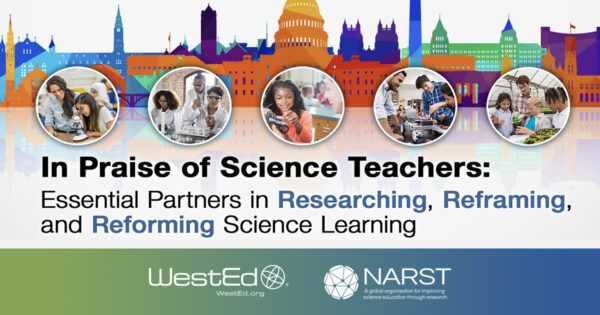Overview
Ashley Iveland is a Senior Research Associate with the Science and Engineering team at WestEd. She serves as principal investigator (PI) and co-PI on large-scale projects funded by the National Science Foundation (NSF) and the Institute of Education Sciences (IES), focusing on developing professional learning programs for teachers in grades 3–8. Her work supports teachers in implementing equity-oriented, standards-aligned science and engineering instruction that fosters student creativity and problem-solving. She has studied Next Generation Science Standards (NGSS) implementation, STEM curriculum efficacy, and the impact of COVID-19 on science instruction. Iveland has led several large-scale research and evaluation projects at WestEd where she develops research plans, project budgets, and timelines and generates high-quality evaluation reports.
Iveland currently leads several major research projects. She is the PI on the NSF-funded DRK–12 project Empowering Changemakers: Urban Biodiversity Initiative for Teachers and Youth (2022–26; $2.68M) and the co-PI on Investigating How Combining Intensive Professional Development and Modest Support Affects Rural, Elementary Teachers’ Science and Engineering Practice (2022–26; $2.95M). She was previously co-PI on a NSF EDU Core Research (ECR) study, Understanding Teacher Enactment of New Science Standards and Needs for Implementation Support (2016–21; $1.5M). Additionally, she is a co-PI and research lead on a $2M IES-funded project (#R305A220456), where she oversees key aspects of research design and implementation.
Education
- PhD in science education, University of California, Santa Barbara
- BA in physical anthropology, University of California, Santa Barbara
Select Publications
Macias, M., Iveland, A., Rego, M., & White, M. S. (2022). The impacts of COVID-19 on K–8 science teaching and teachers. Disciplinary and Interdisciplinary Science Education Research, 4(1), 1–13.
Marckwordt, J., Nguyen, K., Boxerman, J., & Iveland, A. (2021). Teacher enactment of the crosscutting concepts in Next Generation Science classrooms. Science Education, 106(2), 257–284. https://doi.org/10.1002/sce.21691
Iveland, A., Rego, M., Sarna, J., & Wolbrink, V. (2020). Science learning during COVID-19 and beyond [Webinar]. https://www.wested.org/resources/science-learning-during-covid-19/
Carpenter, S., Iveland, A., Moon, S., Hansen, A., Harlow, D., & Bianchini, J. (2019). Models are a “metaphor in your brain”: How potential and preservice teachers understand the science and engineering practice of modeling. School Science and Mathematics, 119(5), 275–286. https://doi.org/10.1111/ssm.12340
Iveland, A. (2017). The engineering design process: Conceptions along the learning-to-teach continuum [Unpublished doctoral dissertation, University of California, Santa Barbara].
Iveland, A., & Harlow, D. (2017). Assessing children’s creativity through engineering design: An investigation of students in grades 3 through 8 [Poster presentation]. Annual American Educational Research Association (AERA) Conference, San Antonio, TX.
Harlow, D., Nylund-Gibson, K., Iveland, A., & Taylor, L. (2013). Secondary students’ views about creativity in the work of engineers and artists: A latent class analysis. Creative Education, 4, 315–321.











